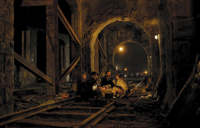A drunken vagrant, Juan Pérez’s (Damián Alcázar) unexpected turn in fortune after sneaking into an office at the World Financial Center headquarters one cold and rainy evening sets the stage for Luis Estrada’s A Wonderful World, a dense, darkly comic, and provocative, if mean-spirited sardonic fairytale on the politics of poverty, charity, globalization, and social reform. Scurrying out the window to avoid being seen, Pérez discovers that he has been locked out when the janitor secures the office after his cleaning rounds. Now stranded on the ledge on the eve of the finance minister Lascuraian’s (Antonio Serrano) landmark speech to the international community declaring that there are no longer any poor people in Mexico, the sight of the disheveled Pérez raving incoherently on the front façade of the building immediately captures the attention of the opposition press, who believe that his boorish attempts to draw attention to himself are the desperate cries of a man brought to the end of his tether by poverty. Seeking to make headlines and impress his hard-nosed editor (Pedro Armendáriz Jr.), a young reporter (Carlos Arau) embellishes Pérez’s passing comment and reframes his misadventure as the iconic image of the government’s failed policies. But when Pérez becomes an overnight cause célèbre in the newspaper’s call for social reform, he soon finds himself courted by Lascuraian’s own political operatives who see his support as a means of discrediting the opposition. Juxtaposing saturated tones and soft lighting that create the appearance of vintage film with contemporary themes of exclusion, marginalization, and disposability ushered by the global economy, Estrada presents the intrinsic fallacy of globalization in its engendering of social polarization. However, inasmuch as Estrada’s indictment of institutional power proves relevant and impassioned – political exploitation by both left and right wing factions, religious hypocrisy, geopolitical meddling, and entrenched bourgeois values – the film’s tendencies toward stereotyping and caricature in its injections of humor (most egregiously, in the portrayal of the poor as grimy, lazy, and oversexed drunkards) ultimately serves to dilute the film’s potency, obscuring more fundamental issues of class stratification and socioeconomic genocide with facile illustrations of an exaggerated national character.
© Acquarello 2008. All rights reserved.
